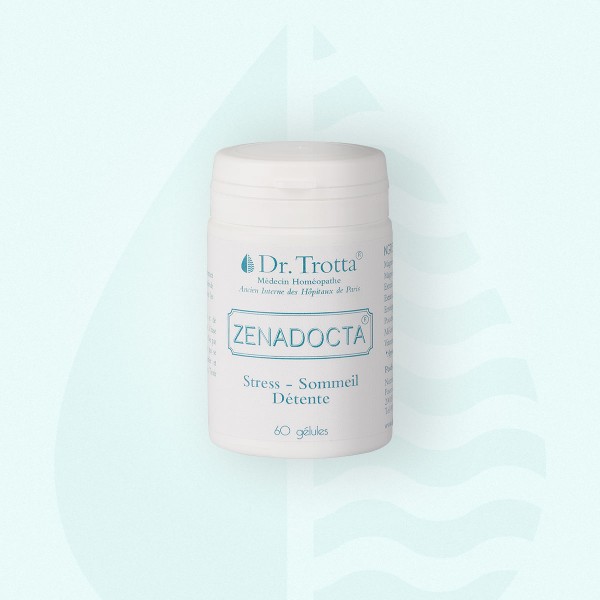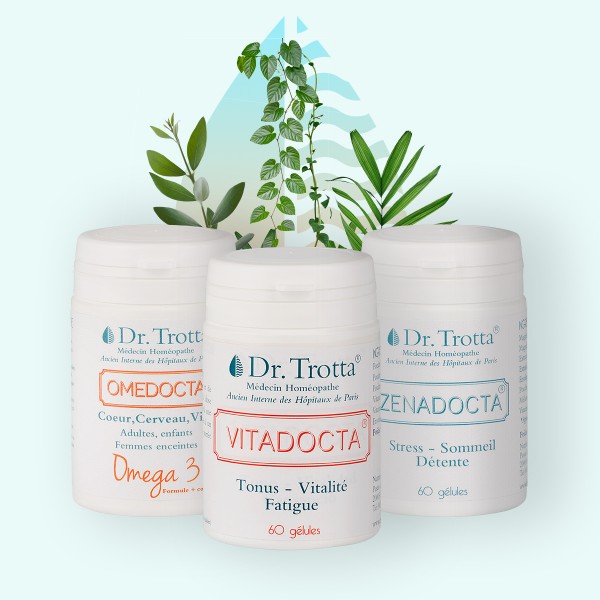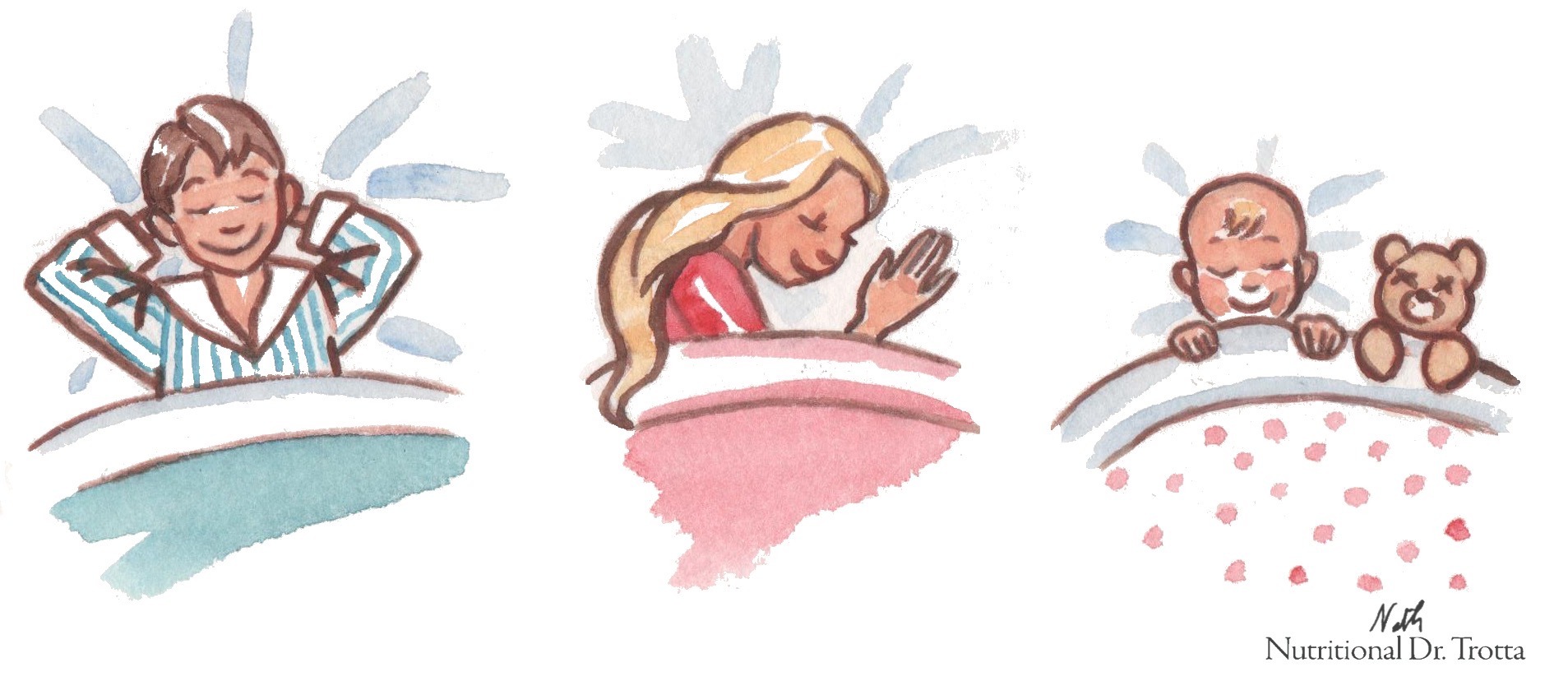Stress, anxiety, depression, insomnia: natural solutions.

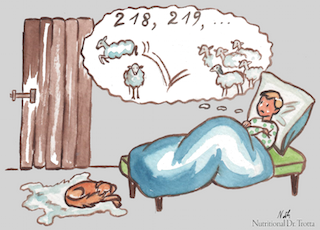 Here’s a new ZENADOCTA supplement developed to heal common problems of anxiety, stress, mild depression and insomnia naturally and without side effects.
Here’s a new ZENADOCTA supplement developed to heal common problems of anxiety, stress, mild depression and insomnia naturally and without side effects.
Melatonin: the sleep hormone, or hormone of darkness.
It is produced in the epiphysis, the gland located in the middle and lower part of our brain.
Melatonin production is inversely proportional to light intensity and proportional to serotonin concentration. Melatonin begins to be produced when the sun goes down and it gets dark (in nature without artificial lighting), and at night when we start to dim or turn off the lights to fall asleep. Peak production is at 5am. It’s the rise in melatonin levels that tells the brain that it’s night or dark, and that it’s time to fall asleep and rest. Melatonin is therefore a very good natural sleep inducer, unlike artificial sleeping pills such as benzodiazepines, which are addictive and habit-forming. This natural sleep hormone promotes sleep onset (reducing the time it takes to fall asleep), increases sleep duration and reduces the number of nocturnal awakenings. Its use in sleep disorders therefore considerably improves sleep quality.
Melatonin is also highly effective in the event of jet lag, helping you to adjust your natural sleep cycle more quickly. It is especially effective when traveling eastwards with a time difference of more than five hours, i.e. when you are leaving for Asia or returning from a trip to the Americas. In this case, for it to be effective, you need to take one ZENADOCTA tablet three days before departure, at bedtime, one capsule on the day of departure at 6 p.m. and then one capsule every evening at bedtime until the natural sleep cycle is restored.
If you’re travelling westwards, take the capsule in the morning until you feel better.
If your jet lag exceeds 10 hours, whether westwards or eastwards, you need to take the capsule before departure and at bedtime at your destination.
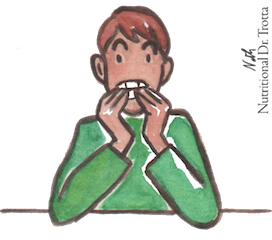 Balancing melatonin and the sleep cycle also balances other health disorders: less appetite disturbance, less fatigue, and greater resistance to stress. Melatonin is also said to have antioxidant effects, limiting the effects of aging on our bodies.
Balancing melatonin and the sleep cycle also balances other health disorders: less appetite disturbance, less fatigue, and greater resistance to stress. Melatonin is also said to have antioxidant effects, limiting the effects of aging on our bodies.
Valerian: valeriana officinalis or catnip
Natural medicine for nervous balance, helps you fall asleep.
Its name “catnip” is due to the attraction these animals have for its scent: while it seems to act as a sedative on humans, its influence is the opposite on cats.
This plant has been used since Antiquity.
It is the root that is used, and is now included in the European pharmacopoeia.
Its root contains Lignans, flavonoids which are antioxidants, but above all sesquiterpene acids, which have sedative properties by binding to GABA receptors.
Valerian root has the following effects:
Sedative, i.e. it soothes, relaxes and reduces anxiety.
Anxiolytic, i.e.it naturally reduces anxiety.
St John’s wort: Hypericum perforatum, the natural antidepressant
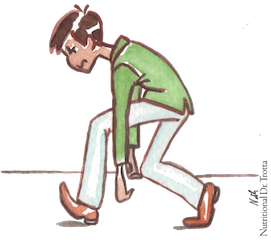 It is a medicinal plant whose therapeutic virtues, known since ancient times, have been confirmed by numerous modern scientific studies.
It is a medicinal plant whose therapeutic virtues, known since ancient times, have been confirmed by numerous modern scientific studies.
Clinical studies on St John’s Wort have involved over 5,000 patients. In over 70% of cases, the plant brings relief for mild and transient depression.
St John’s Wort is as effective as tricyclic antidepressants and all other antidepressants, and more effective than placebo in treating mild to moderate depression, with far fewer side effects.
St John’s Wort increases the concentration of serotonin and other neurotransmitters in the brain. The main neurotransmitters of good mood are serotonin, dopamine and noradrenaline. St. John’s Wort can therefore be considered the plant of good mood (and not the drug of happiness as some antidepressants have been called, which is a lie because no drug gives happiness).
St John’s Wort is a wonderful yellow plant, symbolically reproducing the color of the sun. It stores the sun’s rays to restore its vital energy to tired and depressed patients.
It is especially indicated for seasonal depression, which peaks in winter due to the drop in luminosity.
In the case of sleep disorders, St John’s Wort is particularly effective in reducing middle-of-the-night or early-morning (4am) awakenings.
In addition, St John’s Wort protects the liver, so taking it between 1 a.m. and 3 a.m. will help avoid waking up to liver overload.
St John’s Wort is also highly effective in cases of chronic or acute anxiety, such as pre-exam stress. Taking one capsule of ZENADOCTA as soon as symptoms appear, a quarter of an hour before bedtime, will help you get a good night’s sleep and do better in your exams (provided they’ve been well prepared, of course).
This solar plant is also highly effective in improving communication, encouraging the resumption of exchanges and dialogues and a return to harmony in family, school or professional relationships.
St. John’s Wort will help teenagers, adults and the elderly alike to get through a period of anxiety and sadness without resorting to chemical drugs. In cases of real depression, the St John’s Wort in ZENADOCTA should be supplemented by a prescription for a St John’s Wort mother tincture, which your doctor will recommend.
In cases of real depression, the St John’s Wort in ZENADOCTA should be supplemented by a prescription for a St John’s Wort mother tincture, which your doctor will recommend.
In short, the presence of St John’s Wort in ZENADOCTA will help you to regain your zest for life and joie de vivre.
The only rare side-effect of St John’s Wort is photo-sensitization, which is extremely rare at the usual prescribed doses. But the multinationals that sell the chemical drugs that St John’s Wort competes with have widely publicized and exaggerated this side effect, which is nevertheless far less than the drowsiness, addiction (like a drug), loss of alertness, dryness of the mucous membranes and suicidal raptures caused by artificial chemical molecules (http://www.sciencesetavenir.fr/sante/20150612.OBS0628/enquete-les-antidepresseurs-un-scandale-sanitaire.html). In the United States, as in the United Kingdom, antidepressants that inhibit serotonin reuptake (Deroxat in France) have suffered a number of high-profile setbacks following the discovery of sometimes serious side effects (suicidal tendencies and acting out), particularly when prescribed to children and adolescents.
In France, new warnings have been added to the package inserts of paroxetine-based pharmaceutical specialties since 2007. They concern the increased risk of major congenital malformations (and also pulmonary hypertension) in children of mothers treated with paroxetine during the first trimester of pregnancy. (This is reminiscent of the Servier laboratories’ end-cutting scandal, which led to severe pulmonary hypertension, seriously disabling the lives of patients who had taken them.)
A “special warnings and precautions for use” section has also been added. It warns of “increased suicidal risk in young adults treated with paroxetine, particularly those with major depressive disorders”.
Lemon balm: Melissa officinalis
Traditionally used to treat melancholy and emotionalism.
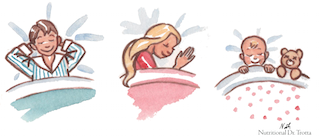
ZENADOCTA contains fresh lemon balm leaves.
Lemon balm has calming and relaxing properties, helping to combat stress, overwork, restlessness, irritability, nervousness, insomnia and minor gastrointestinal spasms.
It has a mild sedative effect, promoting good sleep.
A little history: Lemon balm became popular in France in the 17th century. That’s when the Carmelite monks developed the famous eau de mélisse, which soothed the ladies of the Sun King’s court, who were prone to nervous ailments. Even Cardinal de Richelieu kept a bottle on hand to treat his migraines.
Rhodiola: Rhodiola rosea
This is the stress plant par excellence.
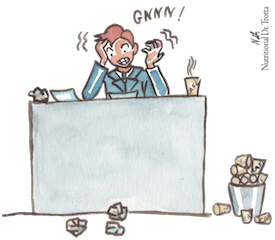 It helps combat chronic stress, which if left untreated can lead to the notorious burnout. It replenishes the depleted reserves of the adrenal glands, gradually restoring nervous balance and much greater resistance to stress, the disease of the modern world.
It helps combat chronic stress, which if left untreated can lead to the notorious burnout. It replenishes the depleted reserves of the adrenal glands, gradually restoring nervous balance and much greater resistance to stress, the disease of the modern world.
Rhodiola is classified as an adaptogen, which means it enables our metabolism to cope with daily and, above all, repeated stress. It differs from stimulants such as nicotine and amphetamine in that it is not habit-forming or addictive.
It is a plant of cold regions and mountains. It was traditionally used by Siberians to withstand the rigors of climate and stress.
It promotes vitality, memory, concentration and general nervous balance. It is therefore particularly recommended for students, professionals and all those suffering from chronic stress.
In ZENADOCTA , Rhodiola has been deliberately kept low in concentration so as not to interfere with sleep. It can therefore be taken in the evening without any problem. In the event of loss of energy, vitality or concentration, one capsule can be taken in the morning and at lunchtime.
The presence of Rhodiola, even in low concentrations, will significantly reduce the effects of chronic stress on your body and help restore nervous balance, resulting in harmony and a better night’s sleep.
Dolomite powder: natural magnesium for stress relief
Dolomite is a mineral rich in magnesium carbonate and calcium carbonate. It contains around five times more magnesium than ordinary limestone. Dolomite also contains small quantities of chlorine, phosphorus and potassium, as well as 20 other trace elements, all of which are excellent for balancing the nervous system.
Chronic stress and a refined diet lead to severe magnesium deficiency, causing numerous spasms and a vicious circle of stress.
The presence of natural magnesium and other minerals such as phosphorus in ZENADOCTA will help potentiate the effect of the plants, enabling you to regain concentration, balance your nerves and get a good night’s sleep.
 Dr Trotta’s advice for a zen-like sleep
Dr Trotta’s advice for a zen-like sleep
– For sleep disorders and stress causing insomnia: 1 capsule a day before bedtime (1/4 hour before).
– If tiredness, concentration problems, memory difficulties, 1 capsule before breakfast and lunch
– If time difference :
– If you are travelling eastwards, from <9h In this case, for it to be effective, you need to take one capsule of ZENADOCTA three days before departure, at bedtime, one capsule on the day of departure at 6pm and then one capsule every evening at bedtime until the natural sleep cycle is restored.
– If you’re heading west, take the capsule in the morning until you feel better.
– If your jet lag exceeds 10 hours, whether you’re heading east or west, take the capsule before departure and at bedtime at your destination.
Dr. Pascal Trotta
Specialist physician, Former intern at Paris Hospitals
Founder of the San Sebastian Institute of Natural Medicine
Make an appointment at the practice or online with Dr.: Tel 05 54 54 44 43
Tel Orders: 05 54 54 44 43
Nos produits naturels
Need more information and to meet Dr. Pascal Trotta?
Make an appointmentAlso read

The benefits of auricular acupuncture for emotional balance
 Dr Trotta’s advice for a zen-like sleep
Dr Trotta’s advice for a zen-like sleep